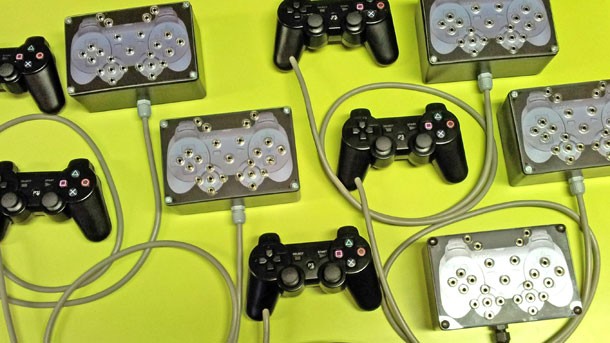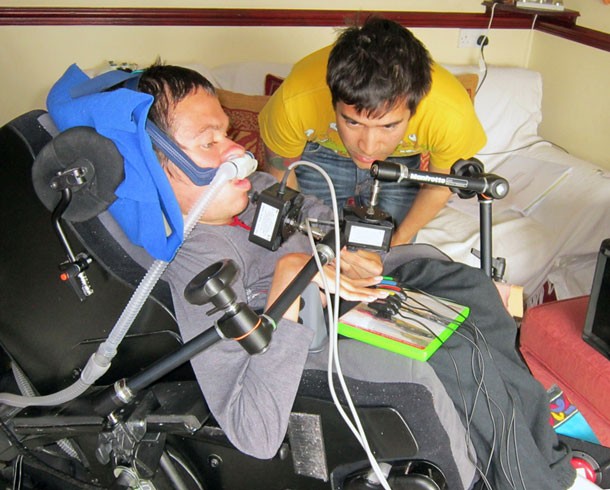Special Effect's Controllers Enable Every Gamer To Enjoy Video Games

Lee Knight was diagnosed with spinal muscular atrophy when he was four years old. This genetic disease causes muscle weakness over time due to the deterioration of nerve cells that connect the brain to the body’s muscles. Mental abilities are unaffected by the disease, but over time muscle movement is progressively limited, which is what happened to Knight.
[This feature originally appeared in Game Informer issue #254]
Knight was athletic and enjoyed playing soccer, but around age 11, he was no longer able to play. By 12, he was in a wheelchair full time, and his interests moved to a new outlet: video games. Over time, Knight’s movement capabilities became more and more limited. Today, Knight has lost all use of his left arm, and can only use one finger and his thumb on his right hand. Thanks to the charity organization Special Effect, however, Knight is still able to play games, even completing complicated action games like Grand Theft Auto V.
Founded in 2007 and based in the United Kingdom, Special Effect is a charity organization bringing video games to the disabled. Approaching each disabled player on a case-by-case basis, Special Effect builds and customizes video game controllers for specific disabilities and loans them out to gamers in need, free of charge. “Everyone’s physical abilities are slightly different – some people we see might have finger movement but no strength to grip a controller,” says Mark Saville, who is in charge of Special Effect’s general communications. “Others might have limited abilities to move their thumbs. And others may have no controllable movement of their bodies at all, apart from their eyes.”
Special Effect doesn't build each controller from scratch. Rather, the organization has a collection of modified controllers, many of which are built by a company called Mondelez International. These controllers are unassuming, looking like a box with a series of input sockets. Each of those sockets corresponds to a button on a video game controller, and different types of inputs can be placed into those sockets to activate buttons.

Simon
has muscular dystrophy. Special Effect has been working with him for
years, updating his controller as his capabilities have changed.
The small staff of 11 has 2 specialist occupational therapists on hand to help identify the best usable body movements from the player and puts together controllers based on those specifications. Special Effect was able to build a special mount for Knight with a modified Xbox 360 controller, placing the buttons under his fingers on his lap. Using his chin, he is able to manipulate the control sticks, which have also been modified with special microlight switches. Knight also has a special mouse controller supplied by Special Effect that incorporates a headset to activate buttons using voice commands.
Setting up someone with a compatible controller often takes more than reconfiguring the standard equipment. “Sometimes we get the drill and soldering iron out to modify controllers, say, to make a -trigger available as a button on the front of the unit, or to install a socket so that an external switch can be plugged in,” Saville says. “If there’s a need to physically modify a controller – for example, to include a secure fixing to mount it to a wheelchair – we’ll take it to the workshop and get out the screwdriver.” Sometimes Special Effect continually modifies a controller as necessary over the course of many years as a player’s disabilities continually limit their ability to use a controller.
For Knight, receiving help from Special Effect has changed his life. “All my life I have played games, and they have bridged the gap between what I can and can’t do,” he says. Before working with Special Effect, Knight says he thought he had lost the ability to play video games, and it was devastating. “I just can’t put into words how much I love games, and Special Effect has allowed me to experience some games that I never thought I would,” he says.
Special Effect has already helped thousands as it continues to expand its work and help disabled gamers. In one scenario, Special Effect helped a gamer suffering from the later stages of muscular dystrophy. “We used a fairly elaborate system of switches and joysticks harnessing what tiny movements of his body he had left, and by the time we left that evening, he was playing Call of Duty with his mother,” Saville says.
There is no selection process or specific medical needs precluding the assistance of Special Effect. The charity organization helps everyone, including accident victims, service personnel with combat injuries, people with congenital and progressive conditions, and stroke patients. If you’re unable to play a video game because of a disability, Special Effect wants to help. “We believe that everyone should have access to video games,” Saville says.
For more information on Special Effect, you can check out the offical website, and follow them on twitter and facebook.

Get the Game Informer Print Edition!
Explore your favorite games in premium print format, delivered to your door.
- 10 issues per year
- Only $4.80 per issue
- Full digital magazine archive access
- Since 1991









